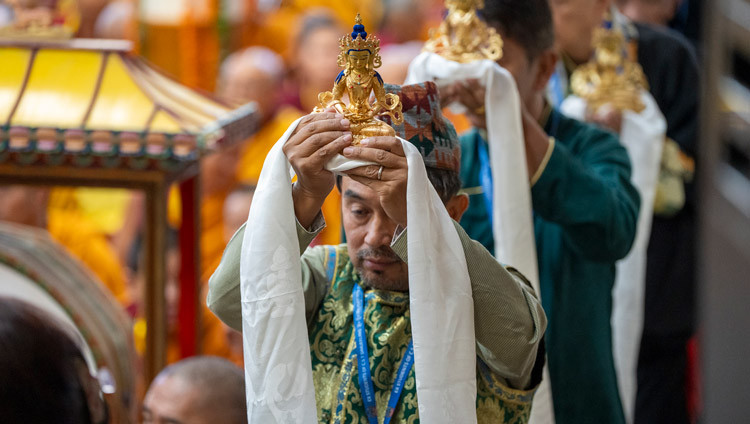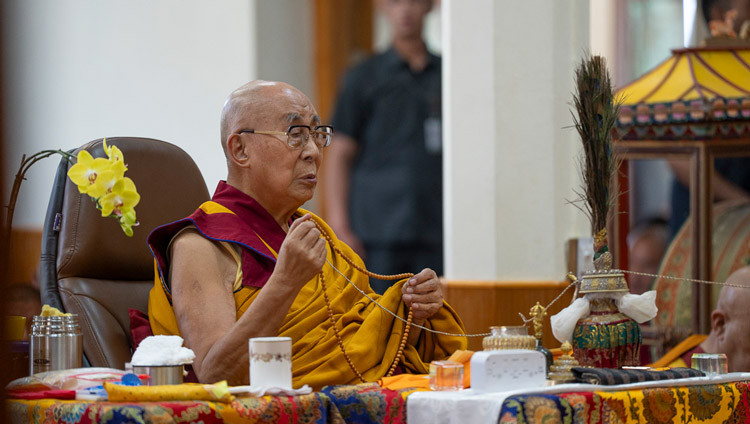Compassion in Action: A Conversation about Leadership – Second Day
Thekchen Chöling, Dharamsala, HP, India – His Holiness the Dalai Lama opened the second day of conversation about leadership with a group of Dalai Lama Fellows by telling them: “It’s a joy to meet with you today.”
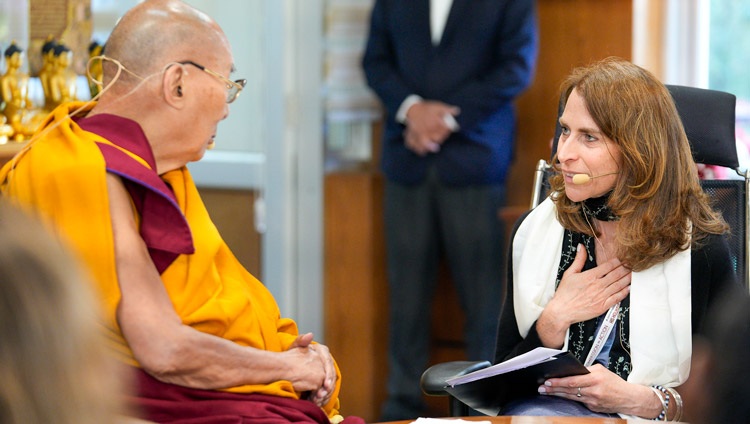
Sona Dimidjian speaking at the start of the second day of His Holiness the Dalai Lama’s conversation about leadership with a group of Dalai Lama Fellows at his residence in Dharamsala, HP, India on March 21, 2024. Photo by Ven Tenzin Jamphel
Sona Dimidjian replied, “We are humbled to be in your presence again. Thank you for yesterday’s conversation which prompted long discussions among us about the oneness of humanity, our shared human values, dedication to a life of service, how to work with anger and how to work with those who do harm. It was a meaningful conversation. We felt yesterday’s conversation opened our hearts.”
The Fellows broke into song once more, chanting ‘Open my heart, let it overflow with love’ as they did yesterday.
Flavia Neves Maia from Brazil, Vuyo Henda from South Africa and Stephen Ogwena from Kenya asked His Holiness about the role of love and compassion in the practice of leadership.
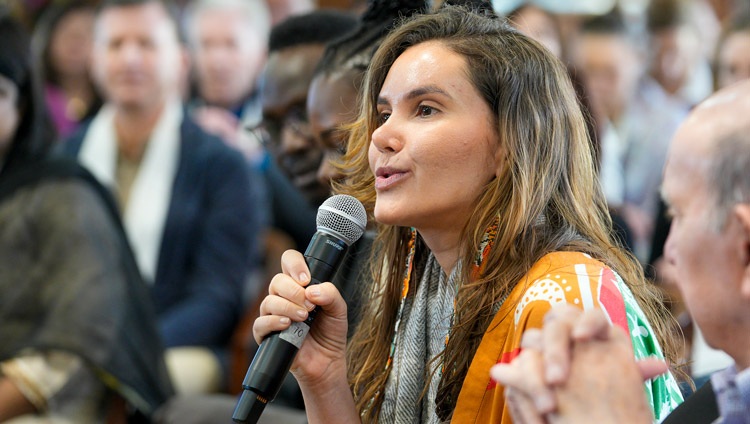
Flavia Neves Maia from Brazil asking His Holiness the Dalai Lama a question on the second day of conversation about leadership with a group of Dalai Lama Fellows at his residence in Dharamsala, HP, India on March 21, 2024. Photo by Ven Tenzin Jamphel
“In the past, to become a leader took power and cunning,” His Holiness replied, “but those days are over. Now leadership depends on warm-heartedness; taking the public into account, particularly the poorer sections of the community. Today, pursuing only selfish aims is very narrow-minded.
“As democracy spreads all over the world people are better informed about what’s going on. Previously they either paid little attention or couldn’t see the whole picture. Now the public are seriously concerned about the general well-being of society.
“In democratic countries we see government of the people by the people, not just a narrow, biased leadership. This is much healthier. Power is no longer in only a few hands.”
“Yesterday, when you spoke about the oneness of humanity,” Sona Dimidjian remarked, “I was reminded of your friendship with Archbishop Desmond Tutu.”
“When I talk about humanity,” His Holiness answered, “I’m thinking about the experiences we have in common. We’re all born of a mother. In the past, there were those who thought some people had mystical powers or healing abilities. Now we’re all the same. There were people who thought the Dalai Lama had mystical powers, but I’m just a human being, no different from all of you. We all experience emotions, some positive, some negative.
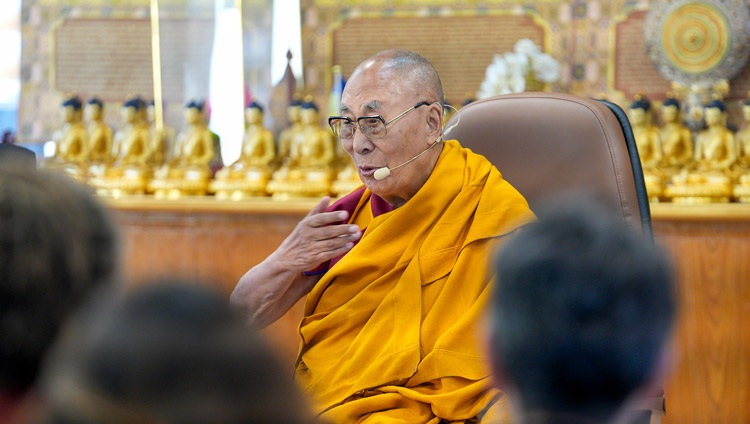
His Holiness the Dalai Lama answering questions on the second day of conversation about leadership with a group of Dalai Lama Fellows at his residence in Dharamsala, HP, India on March 21, 2024. Photo by Ven Tenzin Jamphel
“What does make a difference is education, which can help us broaden our minds. Without that the higher a person’s position, the more narrow-minded they become. One of the features of education is that it helps people gain a broader perspective.
“In my own case, I was recognised as the Dalai Lama in Tibet and placed on a high throne, which created a distance between me and other people. As a refugee I’ve been able to make contact with all kinds of people from all walks of life. And this has taught me to acknowledge the oneness of humanity, how all human beings are essentially the same.
“To think of yourself as somehow special and set apart from others is an old way of thinking. In my own case I feel life as a refugee has been helpful. It’s brought me down to earth.”
Ruchi Varma working in Delhi and Addi Mavengere in Zimbabwe, both trying to bring education to the under-privileged, asked the next question.
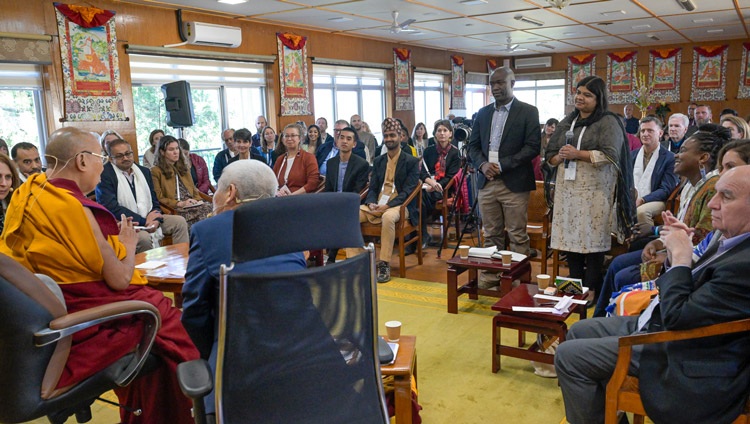
Ruchi Varma working in Delhi and Addi Mavengere in Zimbabwe, both trying to bring education to the under-privileged, asking His Holiness the Dalai Lama a question on the second day of conversation about leadership with a group of Dalai Lama Fellows at his residence in Dharamsala, HP, India on March 21, 2024. Photo by Ven Tenzin Jamphel
His Holiness interjected that education is an area where there is clearly a gap that means that poor people have much more limited access. The important thing, he declared, is that everyone should have the same opportunities.
Ruchi and Addi asked whether we and others can learn from young children how to recognize the oneness of humanity.
“Generally, in most societies,” His Holiness noted, “people look up to the elders, as if they know better, and have little regard for what children experience. However, I believe observing how children think and how they relate to each other is something we can learn from. What’s more, treating children with respect will boost their confidence.”
Shubham Sapkot from the USA working in Nepal and Tim Huang from Bhutan wanted to know how schools can contribute to developing leaders with more compassion.
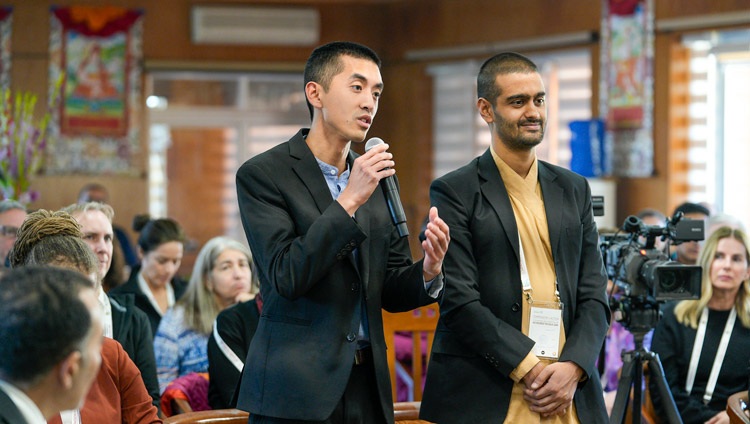
Shubham Sapkot from the USA working in Nepal and Tim Huang from Bhutan, wanting to know how schools can contribute to developing leaders with more compassion, asking His Holiness the Dalai Lama a question on the second day of conversation about leadership with a group of Dalai Lama Fellows at his residence in Dharamsala, HP, India on March 21, 2024. Photo by Ven Zamling Norbu
“Buddhists pray for the welfare of all sentient beings,” His Holiness told them. “This includes all human beings. From that point of view recognizing that all human beings are the same is a crucial part of education. One simple consideration that might help here is to acknowledge that all human beings are the same in wanting to be happy. We’re all born from our mother’s womb and are nurtured by her milk. Of course, this was true of me too even though I was later recognized as the Dalai Lama.
“If you can keep in mind that all human beings are the same, you’ll be happy. Once you start to think of yourself as somehow exceptional you must make efforts to protect that image. When I meet other people, I think, “Here’s another human being just like me”.
“When I was in Tibet, formality kept me apart from others, but anyway, this idea that someone has the elevated status of the Dalai Lama is a purely human construct. These days I’m much happier to be in touch with ordinary people.
“Whether I was confined to the Potala, the Winter Palace, or Norbulingka, the Summer Palace, the formality involved a lot of pretence. From that point of view coming into exile in India has brought me peace of mind. As a refugee I’ve felt freer. The message I’d like to convey more widely is that in being human we are all the same and that it is much healthier to relate to other people as equals.”
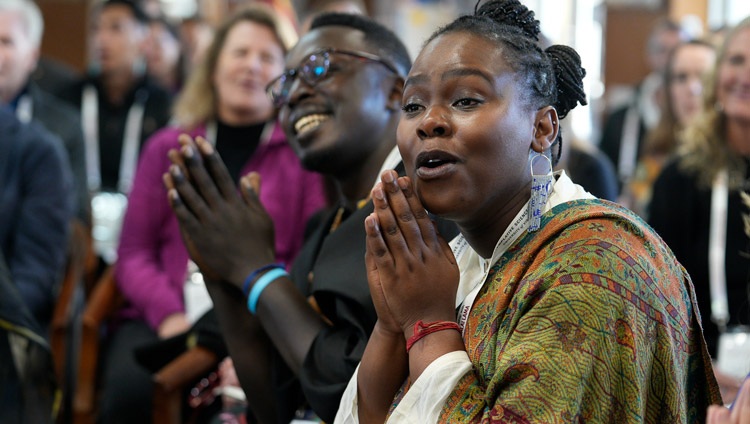
Members of the audience listening to His Holiness the Dalai Lama on the second day of conversation about leadership with a group of Dalai Lama Fellows at his residence in Dharamsala, HP, India on March 21, 2024. Photo by Ven Tenzin Jamphel
Sona Dimidjian remarked that one of the challenges when trying to share basic human values with children is that there is so little support for teachers. The same is often true of the parents who are exhausted earning their living. “How,” she asked, “can these people sustain their motivation in such difficult circumstances? How do you sustain your motivation in the face of so much suffering in the world?”
“One problem,” His Holiness replied, “is that many societies have a hierarchical structure. The more people internalize the idea that they are the same as everyone else, the more confident and courageous they become. In Tibet we elevated Lamas and treated them as somehow special, which only served to isolate them from others. Rigid hierarchical structures are out of date.
“It’s very important to promote the idea that all human beings are essentially the same. Not only do we need care and affection, but we also have the capacity to care for others.”
Ian H Solomon, Dean of the Frank Batten School of Leadership offered some closing remarks. He thanked His Holiness for his words and his blessing, as well as the way his office had facilitated the meeting. He brought greetings from Charlottesville and the University of Virginia where, he said, His Holiness has many friends. He noted that the Universities of Virginia and Colorado, as well as Stanford University are proud to host the Dalai Lama Fellows Leadership Program.
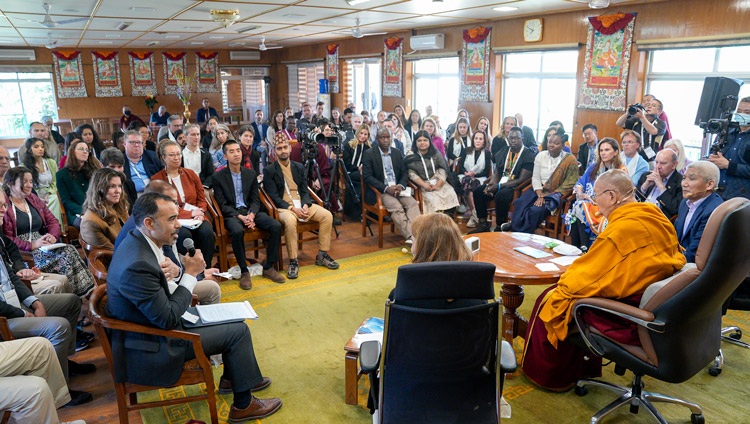
Ian H Solomon, Dean of the Frank Batten School of Leadership delivering his closing remarks on the second day of His Holiness the Dalai Lama’s conversation about leadership with a group of Dalai Lama Fellows at his residence in Dharamsala, HP, India on March 21, 2024. Photo by Ven Tenzin Jamphel
“Across the world people urgently need leadership to overcome the divide between them. We need to reinforce our common humanity through cooperation. Thank you for being the world’s ambassador for peace and compassion. You set an example for us all to follow. Leadership can improve society and anyone can show leadership. Individuals, groups like the Dalai Lama Fellows, institutions and even nations can exercise leadership. The choice we face is to take responsibility for ourselves and others to manage change in the world and bring about justice.
“You have been a model of leadership for us all, warm-heartedly helping those who need help. The Dalai Lama Fellows also make such a choice to be of help to others. The program they take part in is about action and service, less about competition and more about compassion, less about narrow-mindedness and more about warm-heartedness. We’ve seen this in the last few days in their questions and curiosity.
“Although we all want to be happy and avoid suffering, we view each other in terms of ‘us’ and ‘them’. Dalai Lama Fellows can help bridge this divide based on the sameness of all human beings. I’d like to invite them to sing again.”
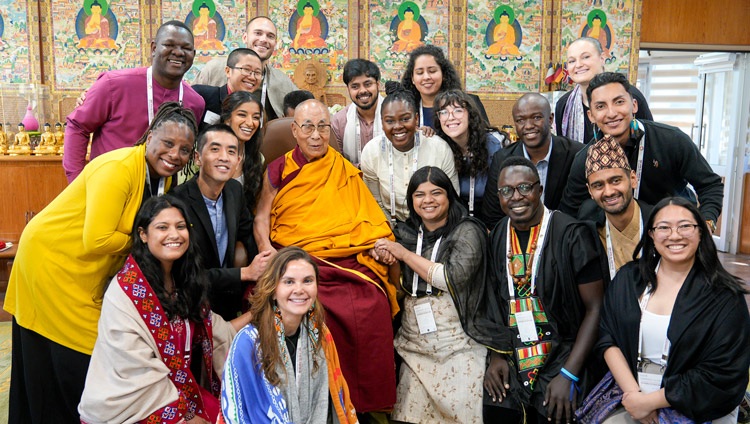
His Holiness the Dalai Lama posing for a photo with participants of the two day conversation with Dalai Lama Fellows at his residence in Dharamsala, HP, India on March 21, 2024. Photo by Ven Tenzin Jamphel
The Fellows brought the meeting to a close gently singing and swaying together in harmony:
Out beyond ideas
of wrong-doing and right-doing
There is a field
I will meet you there.



